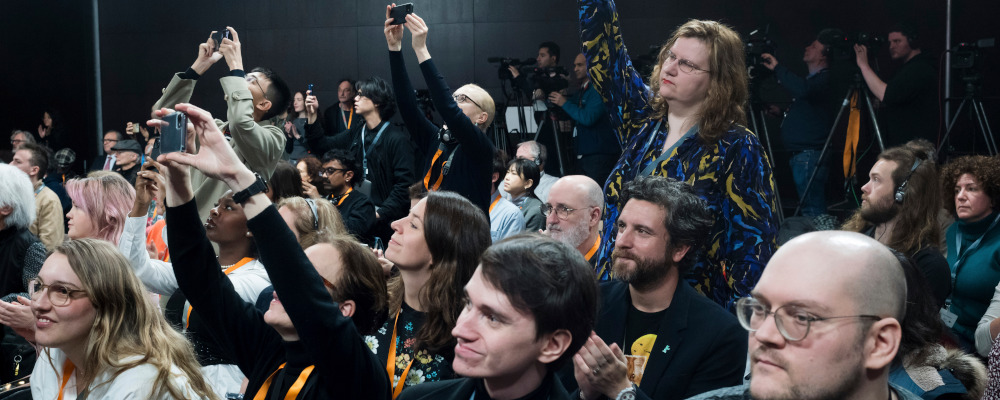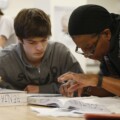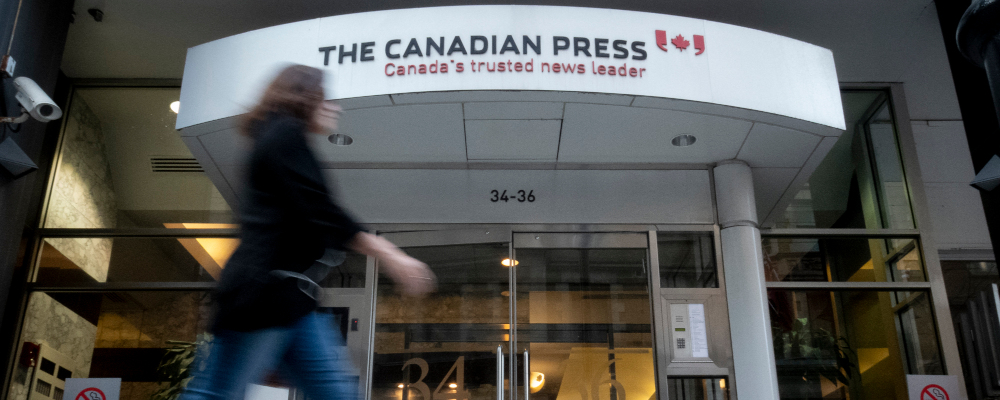The news media in Canada is in crisis. Policy responses to date are failing to solve for the information that citizens need to make informed decisions about important issues and debates. The Future of News series brings together leading practitioners, scholars, and thinkers to imagine new business models, policy responses, and journalistic content that can support a dynamic future for news in Canada.
The cat has truly been set amongst the pigeons with the latest contributions to The Hub’s fantastic series The Future of News, and the feathers are really flying now. It’s almost enough to make you believe that this internet thingy could help us get to the bottom of thorny issues through dialogue rather than by each side shouting at the other across a gaping divide. The first provocative salvo was fired by veteran journalist Steve Paikin, host of TVO’s The Agenda, in a Hub Dialogues podcast interview from January:
I believe there are many younger people nowadays, because they have been taught this way in journalism schools, who believe not only is it their job to figure out which is the best party that ought to govern, but then tailor their coverage accordingly to ensure that the party that they don’t like runs into the roughest time.

That not only prompted a firestorm on social media, especially among older journalists such as myself, but it also brought considerable soul-searching on The Hub’s next podcast with guest Tara Henley. The trend toward activist journalism and the “complete ideological dominance” of the Left, claimed The Hub’s executive director Rudyard Griffiths, was losing credibility with a frustrated public who are “walking away from mainstream media in droves.” Henley put it down to a series of “cascading crises,” most notably a housing shortage that has destabilized society and left young people “extremely angry and frustrated.” A divisive media has been “caught in this cycle of polarization and hyper-politicized content” and has “effectively lost the trust of the Canadian public.”
The Hub’s new managing editor, Harrison Lowman, then did a deep dive into the subject, headlined “Journalism schools are failing a generation of students.” A former journalist with the CBC, CTV, and other media outlets, Lowman wrote that this was something he and his colleagues “had whispered about over late-night beers for years.” While he thought Paikin went a bit too far, Lowman agreed that journalism schools were part of a problem. “They are not raising left-wing partisans, or telling them to support left-wing political parties,” he wrote. “However, journalism schools are now developing and encouraging almost exclusively left-wing storytellers, who are most comfortable with progressive storylines, and who often question the value of objectivity.” He interviewed two working journalists who confirmed his diagnosis. “Journalists are coming into the workspace not fully understanding the fundamentals of journalism,” said one. “Activism has crept into their journalism.”
As an old reporter, I can sympathize to a certain extent with this perspective. I covered hard news as a daily newspaper journalist in Western Canada for two decades in the 20th century, but I never really studied journalism until I did a Ph.D. in the subject at Ohio University after leaving the news business. I subsequently taught the subject at universities around the world for two decades in the 21st century. I have studied objectivity, media bias, and journalism education and written about them in several of my books on Canadian media, in particular 2007’s Asper Nation, 2016’s The News We Deserve and last year’s The Postmedia Effect. I have followed recent events closely for the past couple of years as media columnist for Canadian Dimension, and I am currently writing a book titled How to Save Canada’s Media. I thus feel I can offer some insight into what is going on at this moment in Canadian journalism history.
The current context
First, there is a long-running debate over the value of journalism schools in Canadian media. Some editors prefer to hire grads from other fields and train them personally. “Given a choice of two people with more or less equal experience, we would choose the person who hasn’t gone to journalism school,” said Ken Whyte after hiring 135 journalists to start up the National Post in 1998. “Journalism schools leave people with a narrow appreciation of the craft and a hard-and-fast idea of what it takes to be a journalist.” Former magazine editor John Fraser complained in 1994 that journalism schools “foster institutional rancour and disbelieving zealotry” in students. “I can sniff journalism grads a hundred miles away, and increasingly at Saturday Night I tried to avoid them, unless they could prove to me that they had repented of nearly everything they had been taught.” There were no journalism schools at the university level in B.C. when I was going to school, so I studied business, worked on the student newspaper, and apprenticed at the Vancouver Province. Ironically, most j-school grads don’t end up going into journalism anyway, but end up working instead in some other communication field, usually public relations.
Second, I would be very surprised if journalism schools have taught students to “figure out which is the best party that ought to govern and then tailor their coverage accordingly,” as Paikin asserts. Students are actually farther Left these days than most faculty members. That’s just the way the pendulum swings. They notably led the changes at the former Ryerson Polytechnic, which was re-named Toronto Metropolitan University in 2022 at their insistence because its namesake devised the residential school system. Students similarly ousted the journalism school’s leadership for supposedly perpetuating racism.
My guess is that j-schools in Canada have taught students in recent years, as I have, that with jobs in the mainstream media becoming increasingly scarce, they will have to make their own way online with something readers are willing to pay for if they want to make a living. J-school faculties in Canada tend to be dominated by academics whose background is in cultural studies, which examines things like media representation. (I am from the critical school which studies the effects of ownership.) This is actually a good fit with growing student concern for racism, sexism, environmentalism, gay rights, etc. A glance at the J-source website published by a consortium of Canadian journalism schools out of TMU confirms that “isms” are top of mind while this recent article in The Walrus by two TMU journalism professors tellingly explores issues of media bias in the context of Gaza.
There are undeniably big changes going on right now in journalism, and to understand them you first have to get past the discredited notion of objectivity. I clung to it for decades as a journalist and even after I entered the rarified air of academia claimed it for some time as an ideal, however unattainable it may be, but I have since come to accept that there is no such thing as truly value-free journalism. Journalists are human beings with biases and preconceived notions that are almost impossible to keep out of their writing and even reporting. The best a reporter can do is try to play it as straight as possible, but that is becoming increasingly unpopular and thus unprofitable. Audiences, especially online, now want more than “just the facts, ma’am.” They want to know what the facts mean.

What about objectivity?
There have been numerous books written about objectivity, my favourite of which is Discovering the News by Michael Schudson. My favourite theory about how and why objectivity was adopted by American publishers in the early 20th century is that they disavowed the partisanship of the preceding party press era in order to appeal to readers of all political persuasions and thus build the largest possible audience, which they in turn sold to advertisers. Most newspapers back then, believe it or not, had actually been founded as political party organs. In many other countries, notably in Europe, objectivity never really caught on and political partisanship is still widely practised in journalism. In Malta, where I taught most recently, the news media are mostly owned by or closely aligned with political parties, so their journalism is nakedly partisan and the populace is hopelessly polarized.
Objectivity’s fatal flaw was exposed in the 1950s by news coverage of Wisconsin senator Joseph McCarthy, whose claims that hundreds of communists had infiltrated the U.S. State Department were reported as fact by a credulous press and led to career-ending witch hunts during “McCarthyism” but turned out to be fake news. Objectivity was abandoned by many journalists in the 1960s as part of a so-called “new journalism” that was more personal and subjective.
It has recently been the subject of a renewed spate of books like 2017’s The View from Somewhere: Undoing the Myth of Journalistic Objectivity by Lewis Raven Wallace, a journalist who argues that it has become a shield for privilege and a weapon for right-wing pundits. University of B.C. journalism professors Candis Callison and Mary Lynn Young authored the provocative 2019 book Reckoning: Journalism’s Limits and Possibilities, which claims that journalism is “predicated mainly on good intentions and unexamined, power-laden, gendered, racialized, and colonial relations.” It goes a bit too far for me, but it now tops the Reuters Institute for Journalism’s list of books in the category of “What is journalism and news?”Callison explains its thesis in this interview.
The ongoing changes in media and journalism are being driven by complex social, economic, and technological forces that are difficult to explain in 140 characters or even 2,000 words. Many excellent books have been written about them, and a range of reading is required to get a grasp on this subject. NYU scholar Mitchell Stephens argued in his 2014 book Beyond News: The Future of Journalism that journalists need to sell more than just facts, calling instead for “wisdom” journalism which “strengthens our understanding of the world.” Ontario author Alexandra Kitty’s 2018 book When Journalism Was a Thing nicely chronicles the mainstream media’s “shocking fall from grace,” and she has since written several more thoughtful books on journalism.
In his 2020 book Postjournalism and the Death of Newspapers, University of Toronto communication professor Andrey Mir ascribes growing political polarization and declining trust in media to a shift from advertising to the pursuit of digital subscriptions.His book might be a bit too academic for some, but he has boiled down his argument nicely into a magazine article. I thoroughly enjoyed Newsweek staffer Batya Ungar-Sargon’s 2021 book Bad News: How Woke Media is Undermining Democracy, which helps to explain how and why newsrooms are propagating ideas that were considered radical only a decade ago.
My first rule of media bias is that all media are biased one way or the other, some more than others, and that any claiming to be objective are deceiving themselves and their readers. The second is that most journalists are undeniably more liberal than the average citizen, as has repeatedly been confirmed by research, due to demographic factors such as age, education, income, and urbanism. Media owners, on the other hand, tend to be more conservative and have control over who is hired and promoted and what is published. In the online world, however, journalists are increasingly also in control as entrepreneurs. Third is that media bias is amplified by perspective, as can be seen in the present case. The Hub hews to a free-market perspective, while Henley loudly quit the CBC a few years ago because she felt it had become so woke as to “abandon journalistic integrity.” They thus likely see things more from the Right side of the political spectrum, as many Canadians do.
They make some good points, but to assert the “complete ideological dominance” of our media by the Left is preposterous. Our media are becoming more pluralistic, not less. We do seem to be returning to an era of political partisanship in journalism such as was seen in the party press era as a result of a combination of factors, some of which were elicited by Henley but also include a fragmentation of audiences online, lower costs of publication brought by the internet and a climate crisis considered by many to be existential.
None of this is to minimize our country’s current crisis of journalism. We are truly at a sink-or-swim moment for Canadian media. I have some ideas for repairing some of the damage done in recent years by technology, vulture capitalism, and government blundering that I am formulating for my next book, some of which I outlined recently for The Hub. Having studied this subject for as long as I have, there is one thing I certainly agree with Paikin on: “It is a bloody fascinating story.”
The Future of News series is supported by The Hub’s foundation donors and Meta
Recommended for You

‘Nobody cares who your daddy is’: John Whittaker and Rahim Sajan on what makes Alberta attractive to dreamers, strivers, and entrepreneurs

Alan Kessel: Genocide, weaponized: How a legal term became a political bludgeon

Women’s economic outcomes are improving—but what’s happening with men?

David Polansky: Kind, tolerant Canada is failing the antisemitism test



